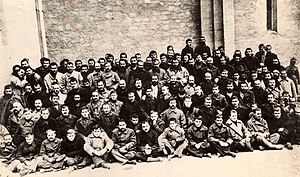Tatarbunary Uprising
| Tatarbunary uprising | |
|---|---|

A group of rebels participating in the uprising (FOCR)
|
|
| Date | 15 – 18 September 1924 |
| Location | Tatarbunary and neighbouring areas, Kingdom of Romania (now part of Ukraine) |
| Methods | Rioting, looting, arson, assault, murder |
| Casualties | |
| 3,000 deaths overall 1,600 rebels arrested |
|
The Tatarbunary uprising (Romanian: Răscoala de la Tatarbunar) was a Bolshevik-inspired peasant revolt that took place on 15–18 September 1924, in and around the town of Tatarbunary (Tatar-Bunar or Tatarbunar) in Budjak (Bessarabia), then part of Romania, now part of Odessa Oblast, Ukraine. It was led by a pro-Soviet revolutionary committee which called for the creation of a Moldavian Soviet Republic and an end to "Romanian occupation".
The uprising was instigated and led by communists from across the Dniester who were opposed to the establishment of Greater Romania and regarded the Moldovans as a distinct people (later that year, a Moldavian Autonomous Soviet Socialist Republic, roughly corresponding to Transnistria, was established inside the Ukrainian SSR). The Tatarbunar Uprising, as well as the uprisings of Khotin and Bender, occurred in those regions in which there were very important demographic changes resulting from Tsarist Russia's policy of settling in Bessarabia large numbers of Ukrainians, Russians and other nationalities. American professor and expert in Moldovan issues Charles King however considers the revolt, along with other similar rebellions in Romanian-administered Bessarabia, as modern jacqueries.
After World War I relations between Romania and Soviet Russia were tense. Since 1918 there were numerous bilateral meetings in Copenhagen, Warsaw, Genoa, and other locations but no consensus could be reached. The Soviets saw Bessarabia as an annexed province and considered the decision of union with Romania as imposed by the occupying Romanian Army. Moreover, historians from both countries intensely debated the treaty with the Soviet Rumcherod in 1918 that required withdrawal of the Romanian Army from Bessarabia but which both countries failed to respect. The legitimacy of the Sfatul Ţării was also brought into question, although the only contested decision is the unification act.
...
Wikipedia
